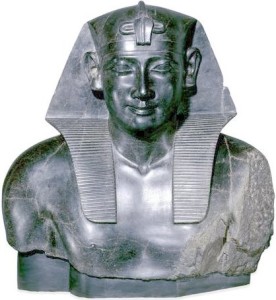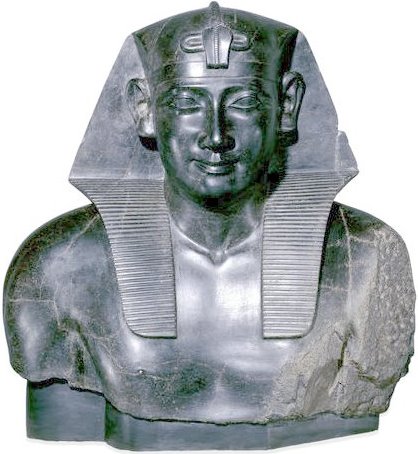 The story of the ascension of Joseph, the Tobiad, as a tax farmer in the Ptolemaic period, illustrates the rise of a new Hellenistic Jewish elite which gained power through Hellenization and which, in turn, fostered further Hellenization of the society. It is probable that this romantic account was take over by Josephus from an earlier source.
The story of the ascension of Joseph, the Tobiad, as a tax farmer in the Ptolemaic period, illustrates the rise of a new Hellenistic Jewish elite which gained power through Hellenization and which, in turn, fostered further Hellenization of the society. It is probable that this romantic account was take over by Josephus from an earlier source.
This happened when Onias was high priest; for after Eleazar’s death, his uncle Manasseh took the priesthood, and after he had ended his life, Onias received that dignity. He was the son of Simon, who was called The Just: which Simon was the brother of Eleazar, as I said before. This Onias was one of a little soul, and a great lover of money; and for that reason, because he did not pay that tax of twenty talents of silver, which his forefathers paid to these things out of their own estates, he provoked king Ptolemy Euergetes to anger, who was the father of Philopater. Euergetes sent an ambassador to Jerusalem, and complained that Onias did not pay his taxes, and threatened, that if he did not receive them, he would seize upon their land, and send soldiers to live upon it. When the Jews heard this message of the king, they were confounded; but so sordidly covetous was Onias, that nothing of things nature made him ashamed.
2. There was now one Joseph, young in age, but of great reputation among the people of Jerusalem, for gravity, prudence, and justice. His father’s name was Tobias; and his mother was the sister of Onias the high priest, who informed him of the coming of the ambassador; for he was then sojourning at a village named Phicol, (13) where he was born. Hereupon he came to the city [Jerusalem], and reproved Onias for not taking care of the preservation of his countrymen, but bringing the nation into dangers, by not paying this money. For which preservation of them, he told him he had received the authority over them, and had been made high priest; but that, in case he was so great a lover of money, as to endure to see his country in danger on that account, and his countrymen suffer the greatest damages, he advised him to go to the king, and petition him to remit either the whole or a part of the sum demanded. Onias’s answer was this: That he did not care for his authority, and that he was ready, if the thing were practicable, to lay down his high priesthood; and that he would not go to the king, because he troubled not himself at all about such matters. Joseph then asked him if he would not give him leave to go ambassador on behalf of the nation. He replied, that he would give him leave. Upon which Joseph went up into the temple, and called the multitude together to a congregation, and exhorted them not to be disturbed nor aftrighted, because of his uncle Onias’s carelessness, but desired them to be at rest, and not terrify themselves with fear about it; for he promised them that he would be their ambassador to the king, and persuade him that they had done him no wrong. And when the multitude heard this, they returned thanks to Joseph. So he went down from the temple, and treated Ptolemy’s ambassador in a hospitable manner. He also presented him with rich gifts, and feasted him magnificently for many days, and then sent him to the king before him, and told him that he would soon follow him; for he was now more willing to go to the king, by the encouragement of the ambassador, who earnestly persuaded him to come into Egypt, and promised him that he would take care that he should obtain every thing that he desired of Ptolemy; for he was highly pleased with his frank and liberal temper, and with the gravity of his deportment.
3. When Ptolemy’s ambassador was come into Egypt, he told the king of the thoughtless temper of Onias; and informed him of the goodness of the disposition of Joseph; and that he was coming to him to excuse the multitude, as not having done him any harm, for that he was their patron. In short, he was so very large in his encomiums upon the young man, that he disposed both the king and his wife Cleopatra to have a kindness for him before he came. So Joseph sent to his friends at Samaria, and borrowed money of them, and got ready what was necessary for his journey, garments and cups, and beasts for burden, which amounted to about twenty thousand drachmae, and went to Alexandria. Now it happened that at this time all the principal men and rulers went up out of the cities of Syria and Phoenicia, to bid for their taxes; for every year the king sold them to the men of the greatest power in every city. So these men saw Joseph journeying on the way, and laughed at him for his poverty and meanness. But when he came to Alexandria, and heard that king Ptolemy was at Memphis, be went up thither to meet with him; which happened as the king was sitting in his chariot, with his wife, and with his friend Athenion, who was the very person who had been ambassador at Jerusalem, and had been entertained by Joseph. As soon therefore as Athenion saw him, he presently made him known to the king, how good and generous a young man he was. So Ptolemy saluted him first, and desired him to come up into his chariot; and as Joseph sat there, he began to complain of the management of Onias: to which he answered, “Forgive him, on account of his age; for thou canst not certainly be unacquainted with this, that old men and infants have their minds exactly alike; but thou shalt have from us, who are young men, every thing thou desirest, and shalt have no cause to complain.” With this good humor and pleasantry of the young man, the king was so delighted, that he began already, as though he had had long experience of him, to have a still greater affection for him, insomuch that he bade him take his diet in the king’s palace, and be a guest at his own table every day. But when the king was come to Alexandria, the principal men of Syria saw him sitting with the king, and were much offended at it.
4. And when the day came on which the king was to let the taxes of the cities to farm, and those that were the principal men of dignity in their several countries were to bid for them, the sum of the taxes together, of Celesyria, and Phoenicia, and Judea, with Samaria, [as they were bidden for,] came to eight thousand talents. Hereupon Joseph accused the bidders, as having agreed together to estimate the value of the taxes at too low a rate; and he promised that he would himself give twice as much for them: but for those who did not pay, he would send the king home their whole substance; for this privilege was sold together with the taxes themselves. The king was pleased to hear that offer; and because it augmented his revenues, he said he would confirm the sale of the taxes to him. But when he asked him this question, Whether he had any sureties that would be bound for the payment of the money? he answered very pleasantly, “I will give such security, and those of persons good and responsible, and which you shall have no reason to distrust.” And when he bid him name them who they were, he replied, “I give thee no other persons, O king, for my sureties, than thyself, and this thy wife; and you shall be security for both parties.” So Ptolemy laughed at the proposal, and granted him the farming of the taxes without any sureties. This procedure was a sore grief to those that came from the cities into Egypt, who were utterly disappointed; and they returned every one to their own country with shame.
5. But Joseph took with him two thousand foot soldiers from the king, for he desired he might have some assistance, in order to force such as were refractory in the cities to pay. And borrowing of the king’s friends at Alexandria five hundred talents, he made haste back into Syria. And when he was at Askelon, and demanded the taxes of the people of Askelon, they refused to pay any thing, and affronted him also; upon which he seized upon about twenty of the principal men, and slew them, and gathered what they had together, and sent it all to the king, and informed him what he had done. Ptolemy admired the prudent conduct of the man, and commended him for what he had done, and gave him leave to do as he pleased. When the Syrians heard of this, they were astonished; and having before them a sad example in the men of Askelon that were slain, they opened their gates, and willingly admitted Joseph, and paid their taxes. And when the inhabitants of Scythopolis attempted to affront him, and would not pay him those taxes which they formerly used to pay, without disputing about them, he slew also the principal men of that city, and sent their effects to the king. By this means he gathered great wealth together, and made vast gains by this farming of the taxes; and he made use of what estate he had thus gotten, in order to support his authority, as thinking it a piece of prudence to keep what had been the occasion and foundation of his present good fortune; and this he did by the assistance of what he was already possessed of, for he privately sent many presents to the king, and to Cleopatra, and to their friends, and to all that were powerful about the court, and thereby purchased their good-will to himself.
